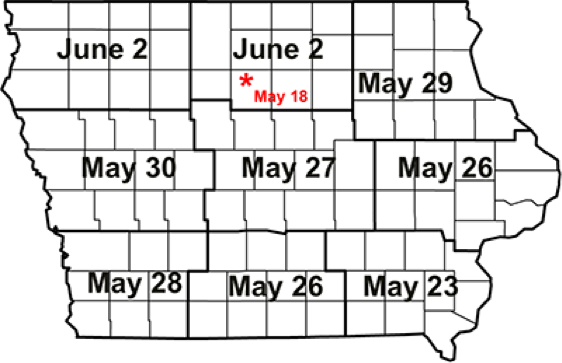Black cutworm moths have made their appearance across Latham Territory. Now is the time to scout your fields to determine if an insecticide application is the best economical decision for your particular circumstance.
Black cutworm moths gravitate towards green vegetation for egg laying, so they will first appear in weedy fields and ones that are next to natural vegetation. Poorly drained, low laying fields also have a higher risk of black cutworm damage. Black cutworm moths travel in from southern states, laying eggs in the field, then producing black cutworm larvae.
Damage from these insects usually begins above soil service. Newly hatched black cutworm larvae will leave small, irregular holes in the leaves. When walking fields, scout for feedings off the corn plant, which will become more substantial as the worms mature. Black cutworms can cut off young corn plants and reduce crop stands. It is advised to watch for signs of cutworm damage beginning when the corn emerges.
The map below shows the predicted black cutworm cutting dates, provided by the Iowa State University Extension, based upon research performed throughout the state.
 This year, the pattern of the black cutworm moths has been irregular. This makes scouting even more essential.
This year, the pattern of the black cutworm moths has been irregular. This makes scouting even more essential.
“With the recent cooler temperatures, emergence of both cutworms and army worms has been delayed,” said Jerry Broders, Latham® Regional Sales Manager for Eastern Iowa.
The cutworm and armyworm are comparable in appearance with similar economic thresholds. The variance in eating patterns is where these insects differ. Black cutworms chew off more mature corn plants, whereas armyworms feed on the leaves.
“My advice is to spray fields as soon you see these insects,” Broders said. “ I have seen cutworms take out a field overnight. They can do severe damage when seedlings are emerging.”
Trait selection is no substitute for scouting, Broders said. He advises that farmers continually scout for insects, because it is going to be a dense year. Download the spreadsheet here to help with black cutworm management decision.
Broders advises all farmers to continue scouting their fields and apply insecticide if necessary. Contact your Latham® Dealer or Regional Sales Manager to discuss the management decisions for your fields.
